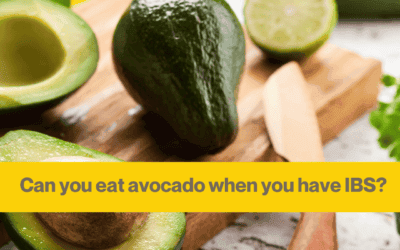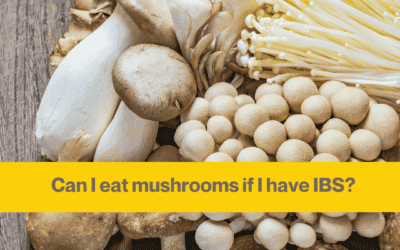Have you tried the FODMAP diet but it didn’t work? Many of my clients come to me saying they’ve already tried several diets for IBS including dairy free, gluten free and the low FODMAP diet.
This is so frustrating, because it’s a well researched diet for IBS. But, in reality everyone’s symptoms and causes of IBS are different, so it makes sense there is not a single IBS diet that would work for everyone.
FODMAP doesn’t work for everyone
If you’re not familiar with the low FODMAP diet you can read my Beginner Guide to the Low FODMAP Diet .
Basically the low FODMAP diet excludes fermentable carbohydrates.
These found are in healthy common foods like apples, avocado, mushrooms or peaches. These aren’t foods everyone should stay away from by any means.
When researchers have tested whether removing FODMAPs from the diet of people with IBS, the results are generally quite positive. Evidence estimates around 50% to 86% of patients will feel better, averaging around 75% of people. So 3 out of 4 people will get relief from IBS symptoms by following a low FODMAP diet.
But what if you’re in the remaining 25%? And what happens when you bring the FODMAPs back into your diet?

What to do if your FODMAP diet isn’t working
The diet is quite hard to follow, so firstly let’s check you’re doing it right, before ruling it out.
If you’re following a low FODMAP diet but still don’t see improvement in your symptoms here’s what to consider:
- Check you’re following the FODMAP diet correctly
The low FODMAP diet isn’t a NO FODMAP diet, it’s reducing foods high in FODMAPS, but portion sizing is key.
- Watch out for hidden FODMAPS (e.g. in sauces or ready meals)
- FODMAP stacking is where you eat two moderate FODMAP foods in a meal and inadvertently make that meal high FODMAP. For example if you eat a moderate portion of artichokes (e.g. 70g) and then a moderate portion of red peppers (around 60g) which when eaten in the same meal could become a high FODMAP meal.
- Monitor your tolerance to portions
The portion sizes for deciding whether a food is high, moderate or low FODMAP were drawn up by the Monash University. I recommend downloading the app if you’re trying to follow a low FODMAP diet.
However, the rules for portions are based on food composition analysis in a lab.
Your digestive processes, genetics and environment will not match lab conditions.
Therefore you may be more, or less tolerant to the foods in a low FODMAP diet.
There is some trial and error expected in this process, even if you follow the diet to the letter, unfortunately it isn’t an exact science.
Let’s look now at why the diet might not suit your and you digestion.
Reasons the FODMAP diet might not work for you
1. FODMAPs aren’t the trigger of your IBS
There are many causes of Irritable Bowel Syndrome (I’ve written before about possible causes of IBS) and it isn’t always even related to food.
Stress is a major driver of digestive pains, and finding ways to manage your anxiety, worry and stress can have a huge impact on IBS.
As part of getting your IBS diagnosis hopefully your doctor ruled out other conditions which need medical attention. These can often be mistaken for IBS, and include inflammatory bowel disease, coeliac disease, diverticular disease and bowel cancer, among others.
If you haven’t yet seen a doctor, make an appointment to get these crossed off the list.
So what else could it be?
If you don’t think it’s stress, or another condition, and it’s food related there could be another trigger. There are compounds in foods which can cause a sensitive digestion to react with gas, pain, cramps or diarrhoea, such as
- histamine (in aged foods like preserved meats, leftovers, fermented foods). I’ve written a longer blog about histamine and IBS you can read the details about how to do a low histamine diet.
- salicylates (including oranges, berries, sweet potato, broccoli, tea, almonds)
- alcohol
- dairy
- gluten
- soy
- corn
Some of these will be reduced in a low FODMAP diet, but many won’t be ruled out completely.
Get the Ultimate Low FODMAP Diet Guide
Follow my step by step process, with 2x tasty 7 day meal plans, checklists, assessment kit.
2. You are sensitive to pain
(This isn’t about not being strong enough, or weak in anyway.)
Visceral hypersensitivity (enhanced communication between your brain and gut) is present in up to 65% of people with IBS
We all get gas and bloating to some extent when we eat.
But, people without IBS don’t experience as much pain or sensitivity as you might, to normal aspects of digestion.
This extra sensitivity to gas and bloating is a common feature of IBS.
There are so many nerves in the gut if these are on high alert it may be triggering your pain response. Medication from your GP may be able to help with calming your nervous system.
Support the vagus nerve
In addition it is worth finding ways to manage your stress. The gut and brain are connected by the vagus nerve, and in times of stress it can affect digestion. Here is a good summary of the vagus nerve and how it can affect digestion.
You can support this key nervous pathway through activities such as:
- Deep breathing – specifically focussing on long slow exhalations
- Yoga – to promote strength of muscles, and learn breathing techniques
- Cold water swimming – to ‘reset’ the vagus nerve communication
- Laughing – relieves stress, reduces pain sensitivity and can help relax the diaphragm
- Singing / chanting – the vibrations help to calm the body
- Gargling – helps tone the muscles in the throat.
3. Your gut transit time is too fast
Food might be rushing through you too quickly, potentially due to a food intolerance (see above) where more water is pulled into the small intestine.
There is also a condition known as ‘dumping syndrome’ where your body secretes hormones that speed up digestion, causing a fast transit through the gut. This can be due to a lack of digestive enzymes affecting the speed of food through the small intestine, or it can be linked to diabetes.
Some people find adding foods like psyllium husk, flaxseeds, chia seeds to their diet can help form a more solid stool.

4. Slow bowel transit time
If food takes a really long time to move through your digestion there is a potential for bacteria to overgrow. This can cause symptoms of IBS like bloating, excess gas, and irregular bowel movements, due to bacteria which starts to grow during the slow passage of food. This is sometimes refered to as Small Intestinal Bacterial Overgrowth.
A slow transit time won’t always look like constipation, you could have a bowel movement every day, but still have a slow transit time.
5. Gut Dysbiosis
We don’t have a blueprint for a healthy gut, but we do know that some bacteria are more associated with digestive issues, and others with good health. If you’ve been following the FODMAP diet for a long time you could have been starving the good bacteria, by removing their food source (fermentable starches).
Certain types of bacteria help to:
- protect the lining of the gut,
- prevent the tight junctions between the cells from becoming ‘leaky’, and
- ward off pathogens by lowering the pH balance of the gut
- ‘talk’ to the immune system to reassure it everything is well.
If you don’t have enough of these good bacteria, or some colonies of microbes have grown and overrun the gut, then we can start reacting to foods, or experiencing more bloating and gas. You can either take probiotics, eat fermented foods, or eat high levels of prebiotics (fibre) which feed the microbes.
If you want a bit more information on Prebiotics and IBS I’ve written about that before.
Some probiotics can help to address the balance of microbes in the gut, so might be useful as a supplement to your diet.
So you can see there are lots of other potential reasons for your IBS symptoms, other than FODMAPs.
The final thing to highlight, is that if your issue is bacterial (e.g. dysbiosis, or SIBO), then the FODMAP diet will only remove the triggers, but not resolve the bacterial overgrowth.
So symptoms can come back. If you’ve been going round in circles with your diet get in touch for a personalised nutrition plan.

IBS Nutritionist
Hi, I'm Anna Mapson, registered Nutritional Therapist.
I help people with IBS and SIBO get control of unpredictable gut symptoms to find long term relief from painful and embarrassing IBS without restrictive dieting.
I can help you to:
- understand your digestion better, so you recognise your triggers
- eat a well balanced diet, with tasty meals that are simple to prepare
- reintroduce your trigger foods so you can get back to enjoying food again
Find more about my 3 month 1:1 Gut Reset programme.
Can you eat avocado with IBS?
The Millennial food of choice, avocado is a really delicious and healthy. But is it any good for people with IBS? The benefits of eating avocado with IBS Avocados are great for adding healthy monounsaturated fats to your diet. This type of fat has been shown to...
Is psyllium husk good for IBS?
If you’re anything like most of my clients you’ve researched all the typical IBS supplements and you might well have seen psyllium husk advertised. Or it could be recommended by your doctor. This blog post will explain how psyllium husk can be used by people with IBS....
Are mushrooms bad for IBS?
Have you ever considered mushrooms a trigger for your IBS? This blog post covers all you need to know to decide if you should keep eating them. The benefits of eating mushrooms with IBS Mushrooms are fungi and are very nutritious. Different species have different...





I suffer from IBS and recently changed my whole diet to low fodmap, I have a lactose intolerance so I eat lactose free and drink lactose free products, but its been about 2 months now and I’ve lost 6 kilos in weight and still get the pain amd my digestive system is not working properly what can I do to find out how to relive myself of pain?
Hi Vicky, it’s possible that there are other issues going on, and the low FODMAP diet won’t help. If you haven’t yet been to a doctor I suggest starting there to see what they say. If they have diagnosed IBS and you don’t need any further tests (e.g. coeliac disease, IBD) then there could be other food intolerances, issues with gut bacteria, lifestyle factors or gut-brain axis elements like anxiety, mood. If you’d like to chat to me about working together you can book a free call so we can talk about how I help people. I hope you find something that works soon 🙂 This is my booking link if you want to find out a bit more – https://calendly.com/annamapson/30min